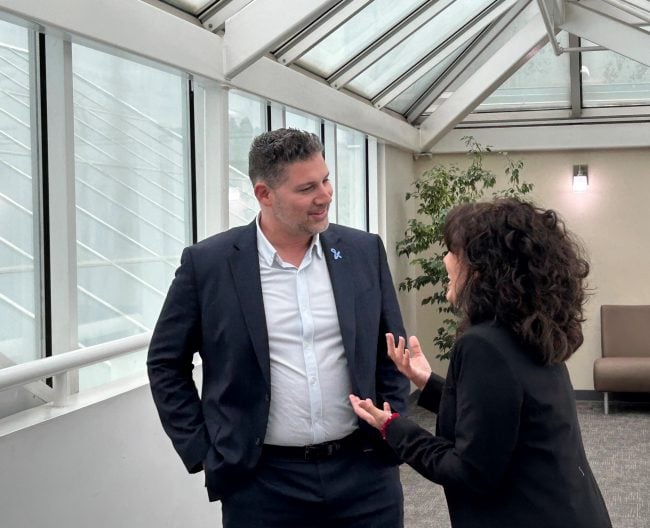//
//
//
//As an electrical engineer, Fred Fernandez never imagined when hewas just lending a hand at Bethex Federal Credit Union that itwould lead to a permanent career.
|“I never thought I'd be in the financial sector. In college, Ihad interned at IBM and Citibank on IT/financial matters butstudied to be an electrical engineer and moved to California,” saidFernandez, who is vice president of IT/remittances at the Bronx,N.Y.-based credit union. “I left California after 9/11 to go backhome to the Bronx because I wanted to give back to my community. Atthe time, I thought the credit union was a good way to do thatuntil I found a real job. I mean an electrical engineer, creditunion. It just seemed incompatible. But I learned so much and beingable to do everything possible to help meet member expectations,develop and deliver solutions that make a difference in memberslives, I knew this was where I wanted to be full time.”
|A natural curiosity for figuring out how things work has helpedFernandez to constantly look for opportunities to help the over $25million credit union function like a $50 million institution.
|“One key question every credit union, large or small, needs tobe asking themselves is how do they stay relevant with theirmembers and employees?” said Fernandez. “How can we do that? If youdon't have a strong bond with your members, a better rate has themgoing somewhere else. We have to be mindful of a changingenvironment and focus on how do I help the members solve theirissues? Don't shy away from the issues. At the end of day that'swhat it's all about, staying relevant by really being in tune withour field membership and that may take challenging ourselves in newways or even new partnerships to make real change.”
|Some of the many advancements of delivering more value haveincluded the implementation of a state-of-the-art Check 21 systemthat has helped the credit union prevent nonsufficient fundschecks. The remittance program, which accounts for one-third ofBethex FCU's income, was based on a first-of-its-kind remittercompliance program created by Fernandez when Bethex became thefirst credit union in the country to serve money servicebusinesses. He also developed a spreadsheet application thatmonitors MSB account holders and supports the billing process foreach account. He has been the credit union's point person innegotiating new MSB accounts and providing the account holders withquality customer service.
|He currently heads four staff members who manage day-to-daybusiness operations for some 60 MSB accounts, which continues togrow. In 2011, Bethex's fee income grew to $1.95 million, anincrease of 47% over 2010 and 83% over 2009. Fee income from MSBsaccounted for 41% of the total.
|As in all small credit unions, Fernandez plays many roles, inaddition to his expertise in computer technology, he has become acertified anti-money laundering specialist and serves as treasurerand compliance specialist.
|“With limited staff, one employee wearing 20 different hats is away of living especially at small credit unions,” said Fernandez.“I'm a multitasker so it's something I enjoy. To me, innovation hasto be defined as the ability to bring new products, services andtechnology to the membership without adding additional cost totheir use as far as member adoption. Sometimes at smaller creditunions when you have just one or two folks doing the bulk of theday-to-day work, thinking about and launching innovative solutionscan look insurmountable. But we've got to overcome the fear of theworkload and possible failure. It's really an opportunity for us tobe creative.”
|To Fernandez, there are no obstacles that can't be breached.There is always a workaround. It's just a matter of finding it andthat means getting input and buy in from staffers.
|“New technology is not always well-accepted, and my goal withany solution has been to involve the employees and get them as muchinformation as I can, so they too have a vested interest in how tomove from A to B,” said Fernandez. “When I was in school, theprofessors kept telling us that getting the solution is not thegoal. It's great to have that, but the process of how things work,how you got there matters. So it's a multiple stage solution ofknowing where you're headed and how to get there in the mostefficient way by making it a team effort.”
|He added that it may be time to rethink the competition.
|“I think all financial institutions have a place in themarketplace, the members we serve are not typically served by thebanks, so I think the challenge with competition is to overcome thecompetition in our mind first. It's almost a mental state where ingeneral we're so reactive to the marketplace that we miss anopportunity to concentrate on the membership, look at how we canserve them in a way that they are not being served by thecompletion. Or focusing on ways we can become more relevant andcreate a bigger bond rather than looking at what the competition isdoing. Our competition isn't the banks or even other credit unions.It's ourselves. We should be figuring out new ways to work as ateam to provide unique solutions tailored for the members.”
|A regular contributor to the We Care initiative that provideslocal community development credit unions with much neededvolunteer resources, Fernandez lives for collaboration. When WeCare donated a server and printer to Transfiguration Parish FCU hewas on hand to set up the credit union's computer system. A smallfaith-based credit union participating in We Care that was on thebrink of insolvency, Fernandez teamed up with another volunteerfrom the network and wrote up a complicated bond claim free ofcharge. He said it's been those opportunities to help make adifference everyday whether in members' lives, staffers or othercredit unions that keeps him excited about being a part of theindustry.
|Along those lines Fernandez said it's past time to develop anational succinct, easily grasped national identification forcredit unions.
|“One of the challenges credit unions have had is being able todefine ourselves in the larger picture,” he said. “It's importantto better define ourselves in terms of communicating what we do ona national level that resonates with members and nonmembers alike.Think of what has happened in the last five years and when I thinkabout what could happen in the future, this is the time for creditunions. We have the potential to make this change and educate thepublic about what we are and how we can better serve them.”
|While wildly optimistic about the good credit unions do lookingahead, it's remaining relevant that he said will be the industry'sgreatest challenge.
|“When I was about to graduate in 1994, I got a Mac. Apple wasgoing bankrupt and everyone had written them off. But look wherethey are now. Serve the member, stay relevant and significant,”said Fernandez. “I had a professor who told me don't concentrate onthe grade, just learn the materials, and the grade will come fromyour understanding of what you've learned. We can't just focus onthe competition or even on just making a profit. If we as anindustry can concentrate on making members' lives better or providea service they didn't think they could obtain, the income aspectwill fall into place. We've got to keep being persistent inexploring the options, trying new approaches to common issues andit's something I try to live.”
Complete your profile to continue reading and get FREE access to CUTimes.com, part of your ALM digital membership.
Your access to unlimited CUTimes.com content isn’t changing.
Once you are an ALM digital member, you’ll receive:
- Critical CUTimes.com information including comprehensive product and service provider listings via the Marketplace Directory, CU Careers, resources from industry leaders, webcasts, and breaking news, analysis and more with our informative Newsletters.
- Exclusive discounts on ALM and CU Times events.
- Access to other award-winning ALM websites including Law.com and GlobeSt.com.
Already have an account? Sign In
© 2024 ALM Global, LLC, All Rights Reserved. Request academic re-use from www.copyright.com. All other uses, submit a request to [email protected]. For more information visit Asset & Logo Licensing.









